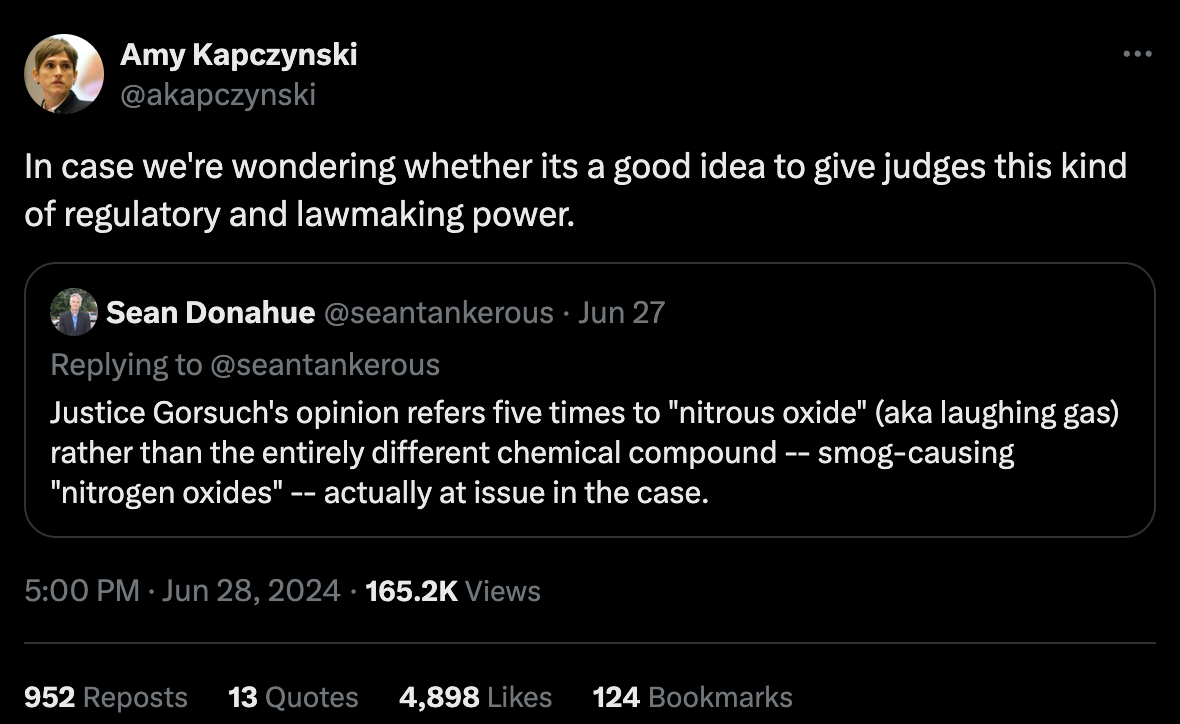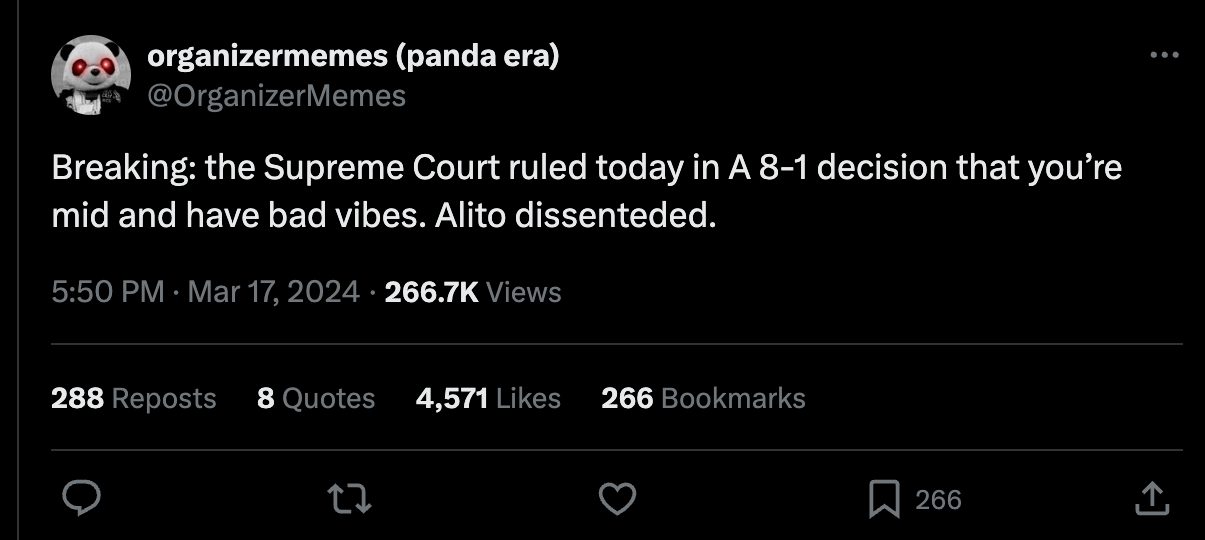Chevron is out of style
says the Supreme Court and gen z
Coming to you live from the wrong Bordeaux-Paris train. I had purchased a seat for the high-speed train but accidentally boarded the slow train because they were next to each other. Now I have double the travel time to write. My loss is your gain! Here’s last week’s health policy letter.
Let’s talk admin law!
Chevron is more than a design pattern dating to 1800 BC
Like some of our eldest millennials, Chevron deference has been in play since 1984, stemming from the Chevron U.S.A., Inc. v. Natural Resources Defense Council, Inc. case. Congress writes ambiguous laws all the time, it’s part of our American regulatory fabric. They’ll draft something like “ensuring the rule is in the public interest,” and leave it up to fed agencies to decode what that might look like. Chevron introduced the idea agency experts (think: physicians, scientists, public health experts) are sometimes better at interpreting these laws than courts. It gave us a roadmap for addressing hazy legislation:
Step 1: Is the statute ambiguous? Or has Congress answered the question/expressed clear intent? If it’s clear, we’re Gucci.
Step 2: Is it unclear? Has the agency interpreted it in a reasonable manner AKA using their expertise and precedent while considering how their interpretation might impact those the law regulates?
Congress doesn’t get into the details, because they’re not experts. It’s not their job to be, they’re elected to legislate, not to stay updated on scientific innovation. Should someone who doesn’t understand the effects of pollution interpret what classifies as dangerous particulates? Should someone who’s likely smart with a law background but has zero clinical experience and maybe failed biology make decisions on public health? No. So, Congress often hands off the specifics to federal agencies.
Here’s how it works: Congress taps a federal agency to handle the details, agencies draft rules and post them on the Federal Register for public comment. (SIDE NOTE: THIS IS HOW YOU CAN HAVE A DIRECT HAND IN INFLUENCING POLICY!) Before finalizing new rules, federal agencies take into account all the comments, existing evidence, prez directives, and a bunch of other shit to create the most fit-for-purpose rule possible before publishing their final rule.
Linking fishing and health, but not in the way that you think
Last week, the Supreme Court decided on the consolidated Loper Bright/Relentless cases. It was about the fishing industry, but the decision will spillover to all federal regulations.
Why was this longstanding precedent overturned?
Some people consider this neglectful legislation. Like lawmakers punting the lawball to federal agencies. Sounds earnest.
Activist Conservatives are celebrating this as a small government win! But it’s a long con big gov Trojan horse. It’s a hit to the checks and balances that keep the American experiment alive. This decision seizes the power from executive branch experts to interpret relevant laws WITHIN THE BOUNDS OF REASON, to bolster the judiciary branch. Neither the Courts nor Congress can be expected to master all topics that impact the American public. We have 438 (!!!!!) federal agencies with specialized knowledge in these United States of America. They all regulate vvvv specific statutes.
Without Chevron deference to federal agencies, Congress needs to ramp up staffing and widen its breadth of expertise to support more active policymaking and reduce vague language. Taxpayers pay congressional staff salaries, btw.
TRM said, “Chevron ruling is bad,” when I told him SDM wanted his even-keeled lawyer take.
You (Chevron-backed regulations) exist in the context of all in which you live and what came before you
In theory, this shouldn’t undermine existing decisions by federal courts, Chevron is a process model. But it leaves many regulations at risk for judiciary challenges, to be interpreted by the same Supreme Court that limited anti-corruption statutes and ruled 6-3 that it’s okay for public officials to accept un petit pot-de-vin (bribe).
So what’s at stake?
I’ll focus on the areas that are most relevant to our health. However, if we’re being honest, everything is about health.
US DEPT OF HEALTH AND HUMAN SERVICES (HHS)
Do you remember when Trump was trying to Make Healthcare Great Again/ remove the Affordable Care Act, but they couldn’t figure out the best way forward? He said something like “nobody knew that healthcare could be so complicated.” Iconic line, I’ll never forget it, because it’s true.
The very public Heritage Foundation Project 2025 manifesto (right-wing policy proposals aiming to consolidate executive branch power in the event of a Republican president), targets the HHS and other agencies responsible for Medicare, Medicaid, and the Affordable Care Act (think CMS, NIH).
Overturning Chevron leaves patient protection statutes on things like preventive service coverage, surprise billing, and infectious disease control on the chopping block.
FOOD AND DRUG ADMINISTRATION
Did you know that the FDA can regulate tobacco products because they made the argument that cigarettes are nicotine-delivery devices? Whether you roll your own or smoke from a USB, it’s a drug delivery device. I assume they’re coming for Zyn next. Tobacco and its bestie industries will likely challenge existing regulations.
The FDA also sets stringent safety + efficacy requirements for pharmaceutical companies before their drugs can be approved in the US.
This can go one of two ways. Either the FDA plays nice to avoid lawsuits from powerful, yet highly-regulated industries, or they continue as usual and get sued. In the former, a weakened FDA has direct implications for public health if drugs are approved with lukewarm data or nicotine delivery devices favored by kids go unregulated. In the latter, a strong FDA would put its regulations in the cross-hairs and could also harm public health.
ENVIRONMENTAL PROTECTION AGENCY
I panic-texted my graduate school advisor when I read the news. She thinks environmental regulation is at higher risk than others, for now. Her response mollified me momentarily, but I’m not fully convinced. I care about safe + effective drugs! I love clean air! And the environment! I was raised to care about how we administer the Earth God gave us!
The EPA has issued rules to address everything from water and air pollution to toxic chemicals. As we’ve learned from the 3M incident, corporations aren’t always acting in the interest of public health. We have goals to cut 50% of our greenhouse emissions, which may not be possible without proper oversight.
To put things into perspective, I’ll leave you with a snippet from Justice Kagan’s savage dissent
In one fell swoop, the majority today gives itself exclusive power over every open issue—no matter how expertise-driven or policy-laden—involving the meaning of regulatory law. As if it did not have enough on its plate, the majority turns itself into the country’s administrative czar.
Justice Elena Kagan 🔥🔥🔥
xxsem




